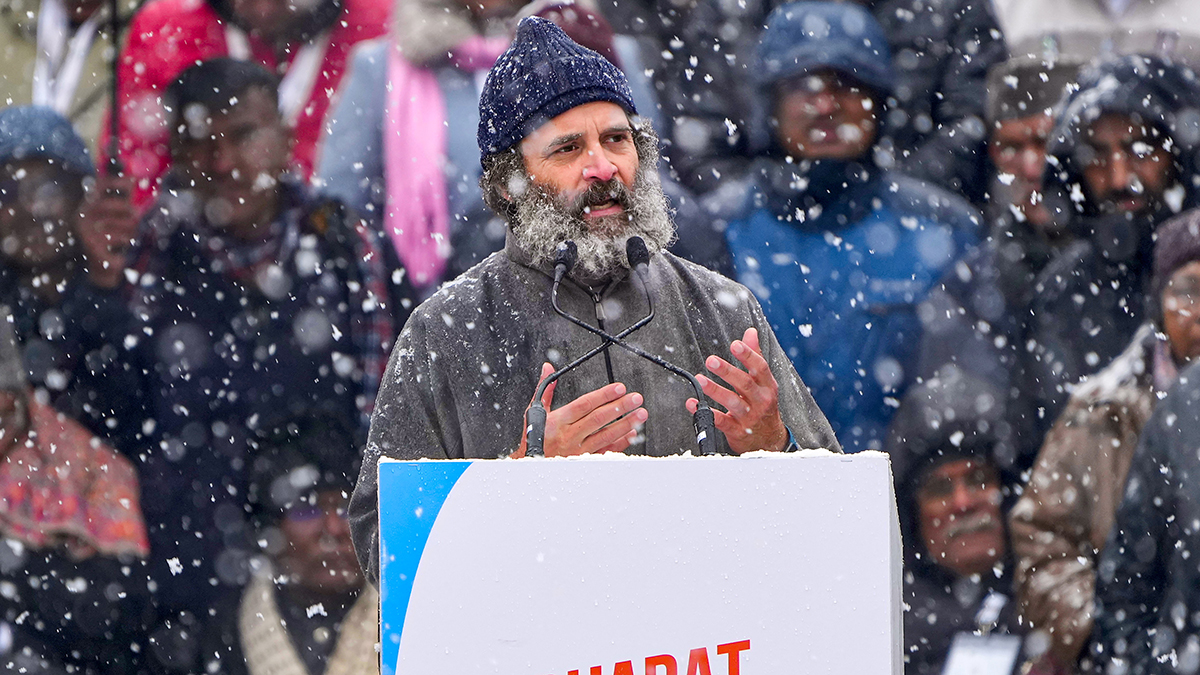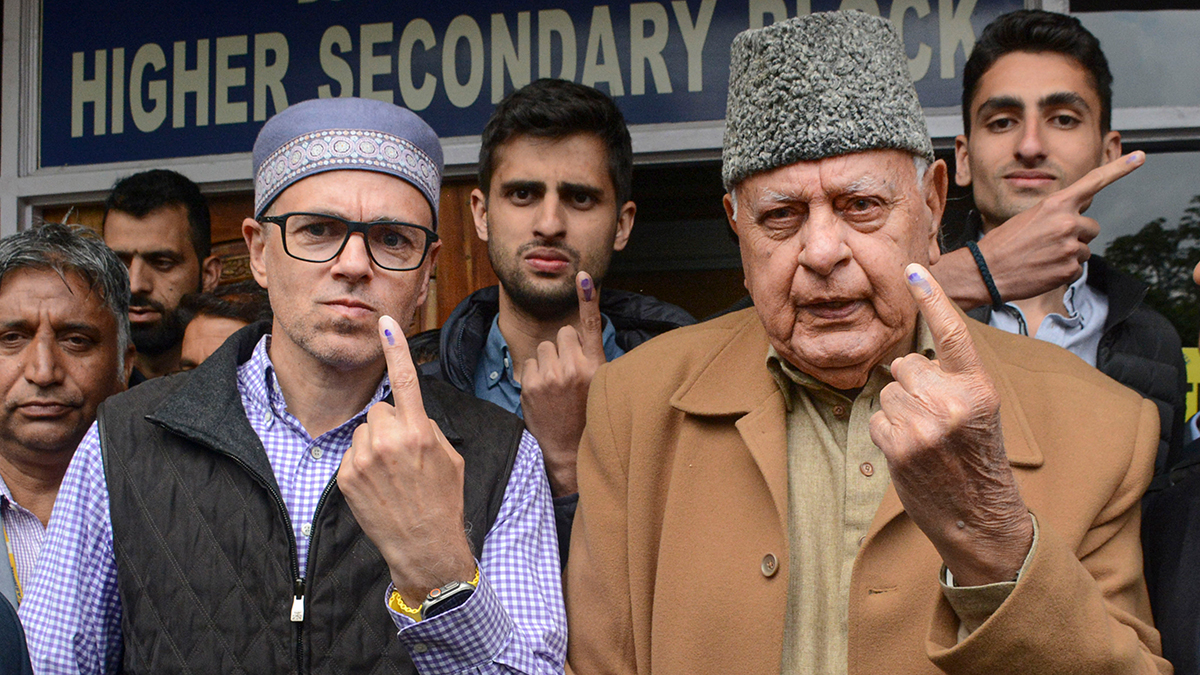What makes the upcoming assembly polls in Jammu and Kashmir different from previous ones is the altered constitutional framework. The reorganisation post the scrapping of Article 370 brought Jammu and Kashmir under the full purview of the Constitution. Thus, the new government will have to operate without the autonomy that the laws once provided.
Established regional parties like the National Conference (NC) and the Peoples’ Democratic Party (PDP) have been grappling with this new reality. To stay relevant, their focus is now on the demand for the restoration of statehood and the need to address issues related to employment, land ownership, inflation, high tariffs and a deep sense of disempowerment among voters.
Imran Nabi Dar, the NC’s chief spokesperson, referred to the upcoming polls as an “alien election”. “This election is being held after Jammu and Kashmir was ruled by bureaucrats for 10 years,” he said. “It surpasses the six-year Central rule in the 1990s, after which elections were held in 1996.”
As the polls draw near, a high-stakes battle is shaping up between the NC and the PDP on one side and the BJP on the other. The BJP must prove that the voiding of Article 370 has restored normalcy and set Jammu and Kashmir on a development path. For the Congress, which aligns with the regional parties, the polls are an opportunity to reassert its role in the region, particularly in Jammu. The task of challenging the BJP, however, largely rests on the NC. With a strong organisational structure, the NC has managed to navigate the choppy political waters after the voiding of Article 370. In contrast, the PDP, which emerged as a formidable force after its 2002 assembly polls victory, has had significant setbacks. Several of its leaders and workers are now with the Apni Party, founded by former PDP leader Altaf Bukhari in March 2020.
The PDP’s influence has been on the wane in its strongholds―Anantnag, Pulwama, Shopian and Kulgam. The NC has been reluctant to join hands with the weakened PDP, as many of its leaders believe that going it alone would be more beneficial. “The PDP is our main rival,” said a senior NC leader. “An alliance with them during their crisis will help them, not us. It will hurt us in the future.”
The NC was in alliance with the Congress and the CPI(M) in the Lok Sabha polls. The party led in 34 of 54 assembly segments in the three Lok Sabha constituencies in Kashmir: Srinagar, Baramulla and Anantnag-Rajouri. The BJP and the Congress chose not to contest these seats, focusing instead on the two Jammu constituencies―Udhampur and Jammu. The BJP led in 29 assembly segments in these two seats; the Congress led in seven.
On August 21, Congress leaders Rahul Gandhi and Mallikarjun Kharge arrived in Srinagar, where they are expected to hold seat-sharing talks with the NC leadership. According to the NC leader, there was a possibility of a “tactical alliance” with the Congress in the Muslim-majority regions of the Pir Panjal range and Chenab Valley, which together have 11 assembly seats where the NC is in direct contest with the BJP. In the remaining Jammu constituencies, the BJP will primarily compete with the Congress.
Unlike in the Lok Sabha polls, the BJP plans to field candidates in Kashmir. “We will have candidates in 25 to 30 seats,” said Sofi Yousuf, vice president of the BJP’s state unit. “We expect to win five to ten.”
The party’s focus, however, will remain on Jammu, where it had won a record 25 seats in the 2014 assembly polls. Observers, however, say the BJP needs to address the growing disenchantment among supporters in the region, as evident from the decline in the party’s vote share in the Lok Sabha polls―from 46 per cent in 2019 to 24.4 per cent in 2024.
 Presence counts: For the Congress, led by Rahul Gandhi, the polls are an opportunity to reassert its role in Jammu and Kashmir | PTI
Presence counts: For the Congress, led by Rahul Gandhi, the polls are an opportunity to reassert its role in Jammu and Kashmir | PTI
The BJP is facing a slew of challenges in Jammu―frustration among voters because of the prolonged political vacuum, anger at the new rules affecting local businesses, and discontent rooted in unemployment, inflation and rising electricity bills.
The BJP-led Union government has implemented several measures to offset these problems. It added six assembly seats in the region through delimitation, introduced reservations for the Pahari and Paddari tribes, and Kolis and Gadda Brahmins, and included 15 new castes in the list of Other Backward Classes.
Dar said the new assembly seats carved out by the Delimitation Commission have altered the power balance between Kashmir and Jammu. “There are also five nominations [to the assembly] with voting rights to be made by the governor,” he said. “That makes it 47 seats in Kashmir, 43 in Jammu, plus five nominations.”
The BJP has also introduced reservation in jobs for those living near the international border in Jammu, and granted citizenship rights to refugees from west Pakistan and Pakistan-occupied Kashmir. One of the five nominated members in the assembly would be from the refugee community from PoK. “This time we will fight elections in Kashmir and do well,” said Nirmal Singh, chairman of the BJP’s election committee and former deputy chief minister.
Dar said those who opposed the BJP faced serious challenges. “They will need to give the mandate to one party, as they have witnessed BJP rule for ten years now,” he said.
Political analysts say only a united front of regional parties can prevent the BJP from forming government. “They (the parties) need to work out an arrangement; otherwise, all of them stand to lose. They can agree on seat-sharing based on the leads in assembly segments,” said Noor Ahmed Baba, former head of the department of political science at the University of Kashmir, Srinagar.
The polls will also decide the fate of the parties that the NC and the PDP label as the BJP’s proxies―the Apni Party, the Democratic Progressive Azad Party (DPAP), and the People’s Conference. While the Apni Party has struggled to gain traction, the DPAP, led by former Congress leader Ghulam Nabi Azad, is yet to establish itself as a credible alternative. The People’s Conference, led by Sajad Lone, has support in North Kashmir, particularly in Kupwara district, but its broader appeal is doubtful.
Waheed Parra, the PDP’s youth president who came second in Srinagar in the Lok Sabha polls, said the assembly polls were about reclaiming what the people had lost. “There is a complete sense of dispossession in Jammu and Kashmir,” he said.
With institutions being mostly run by people from outside Jammu and Kashmir, there is a strong desire among local residents to reclaim their political space. “This is what makes this election so important,” said Parra. “While it may be too much to expect that the government will fully meet expectations, it will help alleviate some of the fear.”
Those who reached voting age since the previous assembly polls in 2014 are eager to elect a government that listens to their concerns. Kashif Amin Malik, a 24-year-old student from Noorabad in Kulgam district, belongs to this new generation. “Some people don’t understand the power of their vote,” said Malik, who voted in the 2024 Lok Sabha polls. “If you don’t vote, you can’t elect the person you want to represent you in the assembly. That is self-disempowerment.”
Muzamil Ahmed of Pulwama said the present administration was disconnected from issues that the people face. “Even when matters are brought to their attention, it takes time to fix problems because approval has to come from the lieutenant governor,” he said.
Day-to-day problems such as water scarcity and inadequate transportation, he said, are best addressed by local politicians who are connected to their communities. “A local politician is aware of these problems because he experiences them himself,” said Ahmed.
Power supply is a major concern for Muhammad Amin, a 21-year-old political science student from Lolab, close to the Line of Control in Kupwara. “Electricity supply is erratic, and outages are frustrating, especially in winter,” he said. Lolab, according to him, has also been neglected as a tourist destination.
Across Kashmir, there is demand for an elected government that understands the aspirations of the youth. What seems an added motivation for the youth to vote is the way the two MPs from Kashmir, Agha Syed Ruhullah Mehdi and Mian Altaf Ahmed Larvi, raised the issue of abrogation of Article 370 and other matters concerning Kashmir in Parliament.
Even older voters are upbeat. “The first time I voted was in the 1987 assembly polls,” said Mushtaq Ahmed, 60, owner of a department store in the upmarket Balgarden area of Srinagar. “I had voted for the Muslim Mutahida Mahaz (Muslim United Front, or MUF).”
The MUF was a coalition of separatist parties that challenged the dominant National Conference. The polls were rigged in favour of the NC, leading to anger among MUF supporters. A year later, militancy erupted.
Also Read
- Omar Abdullah mulls legal action against LG Manoj Sinha's move to nominate 5 MLAs to J&K Assembly
- How Jammu and Kashmir is gearing up to hold its first assembly election in a decade
- 'Supporting village defence committees to deter terrorists': DGP, J&K Police
- 'Elected govt will get complete support of the LG': J&K LG Manoj Sinha
“I voted again in the Lok Sabha polls this year because the situation in Jammu and Kashmir has been difficult after the reading down of Article 370. We have been disempowered,” said Ahmed.
In Jammu, too, people feel that the increased powers of the lieutenant governor have undermined democracy. “Democracy must stay alive; otherwise, it doesn’t take much time for a Bangladesh-like situation,” said Ashok Sharma of Jammu. “Democracy is the identity of India, and people can’t be treated like cattle.”
The demand of voters seems clear: a government that listens, understands and acts on their behalf. Whether the first assembly polls under the new political order would be able to deliver it will be closely watched, not just in India but abroad as well.


